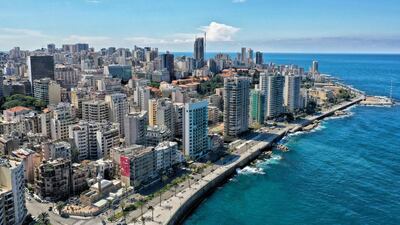Lebanon will stop paying all dollar-denominated eurobonds as it seeks to come up with an exit plan from its worst economic crisis in three decades and tries to restore stability and preserve its foreign exchange reserves, the finance ministry said on Monday.
"In order to protect the reserve from foreign currencies ... and in view of the increasing pressure to access foreign currencies, the government decided to stop paying all eurobonds in US dollars," the finance ministry said in an emailed statement on Monday.
The decision comes after the government said on March 7 it would suspend the payment of $1.2 billion (Dh4.4bn) of eurobonds due on March 9. Today's decision impacts 29 eurobonds, according to the finance ministry. Rating agencies downgraded Lebanon in the run up to its decision earlier this month to virtually default.
The decision was "expected" given the government's default on March 9, said Nassib Ghobril, chief economist at Lebanon's Byblos Bank. "It just made it official and the markets were expecting this."
The government "intends to hold talks in good faith with its creditors as soon as possible," the ministry said.
Lebanon has another $700 million due in April and $600m in June. In total it has about $31bn in bond maturities. The bulk of the debt is held by Lebanese financial institutions (banks 33.4 per cent and the central bank 43 per cent).
"The government will take all measures it deems necessary to manage Lebanon's limited foreign currency reserves wisely and with caution," the ministry said. The government remains "firmly committed to a three-pronged initiative for economic reform and is in the process of developing a sustainable macroeconomic plan to correct the status of the Lebanese economy."
The government's economic reform agenda aims to restore sustainability to public finances by restructuring public debt and adopting a series of financial measures. It aims to put in place an environment conducive to growth as long-delayed structural reforms take place and an improvement in governance and combating of corruption, key demands of protesters and international donors, are met.
The government's plan also aims to restructure and restore stability to the country's financial system and banks. Some analysts have called for banks in the country to consolidate.
The finance ministry will hold an investor presentation on March 27 and Lazard Frères, Lebanon's financial adviser, is overseeing the arrangements.
Lebanon has one of the highest debt-to-gross domestic product ratios (166 per cent) in the world, according to the Institute of International Finance (IIF). Its public debt increased 7.6 per cent to $91.64bn year-on-year as of the end of December 2019.
Lebanon traditionally relied on its economy growing at a faster pace than the growth of its debt, while the country attracted foreign investment and deposits from a large Lebanese diaspora through high interest rates, which helped the government fund its fiscal and current account deficits.
Civil war breaking out in neighbouring Syria in 2011, internal political problems followed by the collapse of oil, led to investment and deposit flows plunging and the economy stalling.


